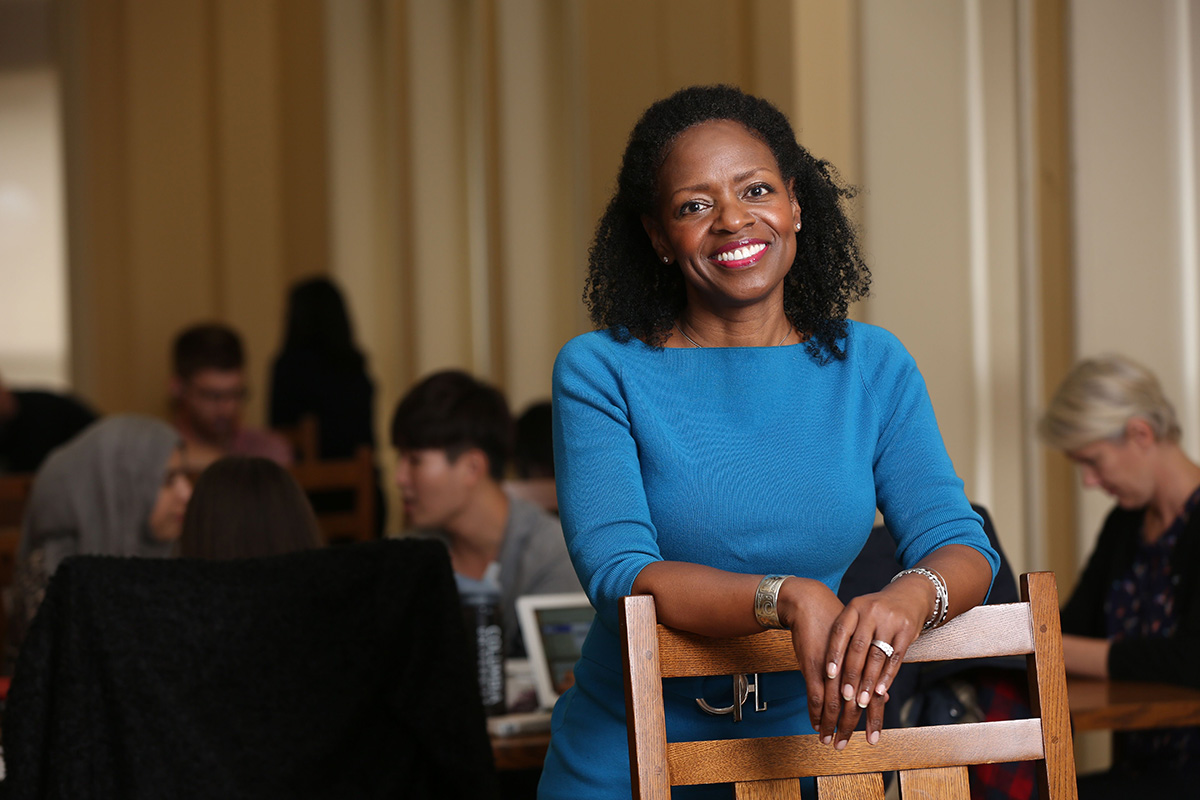There have been many major changes on the international landscape during the past 15 years, but at Teachers College, there has been one constant in the College’s wide-ranging international work: Portia Williams, who in 2008 became the founding director of the new Office of International Affairs and has since led the College in expanding its global footprint from a handful of countries at that time, to more than 50 today.
In early April, TC Provost Stephanie Rowley announced the appointment of Williams — a TC alumna in International Educational Development and Policy Studies who has worked in international education and development in North and Sub-Saharan Africa, Europe, East and Southern Asia, Latin America, and the Middle East — as Associate Provost for International Affairs. Williams was also asked to oversee the College’s Office of International Student and Scholar Services (OISS), with a continued focus on supporting students through the pandemic, while also strengthening and expanding support services.
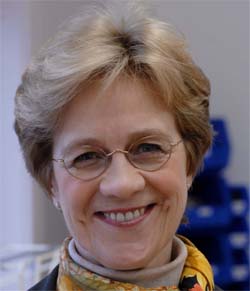
“Portia has been a great friend to the Center for many years. She is an experienced, knowledgeable, and enthusiastic international partner for us at the College, and has provided us with support in so many different ways”
In the following interview, Williams explains the office’s approach, describes some new alliances, and outlines its near- and longer-term priorities.
You’ve been heading up the International Affairs function since it was first created at TC in 2008. What does your appointment as Associate Provost signify about the College’s international work going forward?
I’m quite honored to have been named Associate Provost. The creation of this post shows the College’s ongoing commitment to international work, scholars and students, and to the kind of work our faculty are doing, which goes well above and beyond their teaching.
Give us a brief overview of what the Office of International Affairs does and the philosophy that guides it.
TC has a long and rich tradition of international work, dating back to its beginnings. In 2008, Susan Fuhrman, who was then TC’s President, was very interested in coordinating and amplifying some of that work, and that was why the office was created. President Bailey and Provost Rowley want to build on those efforts and focus them for a new and different time in the world.
There are many faculty members at TC who do international work, and many of their collaborations are established or facilitated through our office. There are also many international initiatives that are conducted independently by faculty who may use us more for guidance on internal policy.
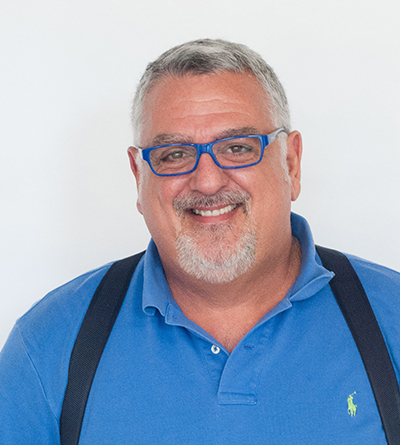
“Portia has a deep knowledge of how to get things done at TC and is a true resource when it comes to proposals, budgets and contracts — but most importantly, she understands how international projects work at their core, and is able to weave through the intercultural and cross-cultural complexities of linguistic and cultural diversity”
For those projects that are facilitated through our office, we are generally involved in getting the project established and implemented. In the pre-project stage. We work to build the relationships, plan the project scope, and negotiate the agreement. After the initial implementation, we are less involved as the project goes into full swing.
Another very important thing we do in our office is to act as a clearinghouse of information on international work. We’re keepers of the history — for example, if there’s a need to know how many projects TC has in China, where the College has had longstanding involvement. Or if we’re in a country where we haven’t worked as much before — do we have relationships there? Who there might want to work with TC and why?
We take a very different approach from many other institutions. We didn’t and don’t want to be an American university in a foreign land competing with local universities. We want to take advantage of existing expertise, and — when appropriate — help build local capacity.
—Portia Williams, Associate Provost, International Affairs
As for our philosophy, we take a very different approach from many other institutions.
Back in 2008, a lot of U.S. universities were establishing branch campuses in other countries with varying degrees of success. We felt that the right approach for Teachers College was to collaborate with ministries of education and local institutions of higher learning in different regions. We didn’t and don’t want to be an American university in a foreign land competing with local universities. We want to take advantage of existing expertise, and — when appropriate — help build local capacity.
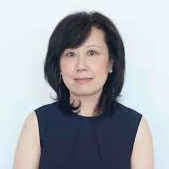
“As an administrator, Portia has substance, integrity, and the right skill sets, a rare asset at the College”
We decided that the best way we could do that was to work through Columbia University’s nine Global Centers in Beijing, Mumbai and other locations around the world. The Global Centers are not campuses. Their main goal is to provide regional support in a number of different forms. And our arrangement with the Center has worked very well. Over the years, we have worked closely together and they have supported us in facilitating a number of educational initiatives in many of their locations.
We wouldn’t think about doing the work without the opportunity to meet with people in the field, meet with teachers, observe classes, ask questions, learn about their concerns and their concerns about working with an outside group like Teachers College and specifically with an American organization. Those can be challenging conversations, but they establish strong relationships and lay the foundation for a very effective collaboration.
—Portia Williams, Associate Provost, International Affairs
There’s one other aspect of our approach that I want to mention, and that’s the importance of meeting our potential partners, observing their work firsthand, and building relationships with them. I recently traveled to Algeria and Tunisia for two weeks with two TC faculty members in order to meet with the Ministers of Higher Education and regional educators and to observe classes. Of course, you can’t really know a country in just a week or two. But we wouldn’t think about doing the work without the opportunity to meet with people in the field, meet with teachers, observe classes, ask questions, learn about their concerns and their concerns about working with an outside group like Teachers College and specifically with an American organization. Those can be challenging conversations, but they establish strong relationships and lay the foundation for a very effective collaboration.

“Portia truly celebrates the amazing international work of our students.”
As Associate Provost, you now are also overseeing the Office of International Student and Scholar Services (OISS). What’s the rationale for that alignment?
The decision to merge the Office of International Affairs with the Office of International Students is not just to have a one-stop international shop but to consider more broadly how we engage in the world. Many of our faculty do international work, and our goal is really to think about how to integrate and leverage further involvement and recruitment from the places where we are active.
Our goal is really to think about how to integrate and leverage further involvement and recruitment from the places where we are active. If we have a large percentage of students coming from a specific country, can we strengthen our institutional relationships there? And if we are an active presence in a country but have low student enrollment from that country, can we strengthen our recruitment?
—Portia Willams, Associate Provost, International Affairs
For example, if we have a large percentage of students coming from a specific country, can we strengthen our institutional relationships there? And if we are an active presence in a country but have low student enrollment from that country, can we strengthen our recruitment?
It’s common in some programs — in the Department of International and Transcultural Studies, for example — for faculty to involve students in their international work. But today, as we look across the College, more and more faculty are engaging in international work and that creates more and more opportunities for students to engage as well.
And it’s not just students. Working with TC’s Office of Alumni Relations and Office of Admissions, we’d like to involve more of our alumni as well.
What impact has the COVID pandemic had on our international work — and what will the impact likely be longer term?
In higher education in general, it has been a fearful time for people working internationally. Quite a number of institutions have laid off some of their internationally focused staff.
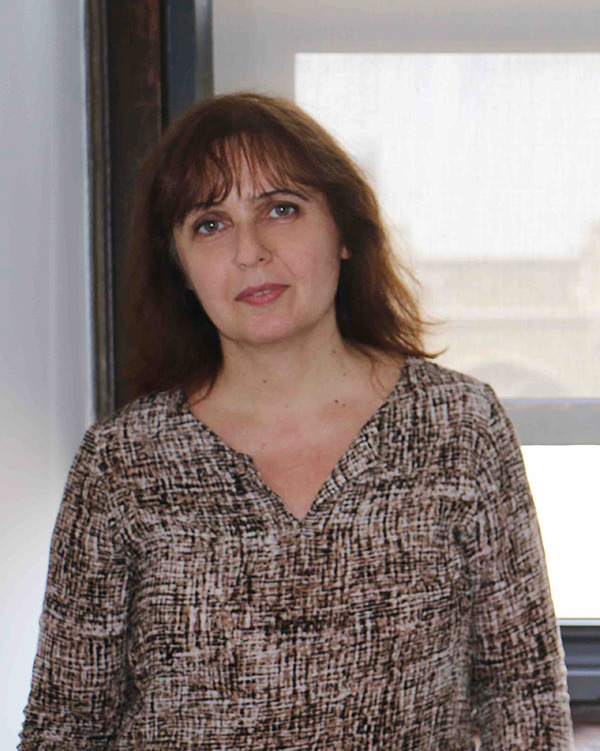
Portia’s unwavering support to the Global Mental Health lab's research has been critical to our success. With unparalleled energy and positivity, she helped over the years connect the dots between our projects and international agencies and institutions that are invested in sustainable and ethical knowledge-sharing . One good example is our recent collaboration with Iraqui academics who reached out for capacity-building on specific psychological skills to help manage students' distress. Every time I think of Portia, the word 'delightful' comes to mind.
But at TC, thankfully, we have had the opposite experience. Our work has increased, particularly around people’s interest in online and digital education. To cite one example, our partners in the Tunisia project asked us to incorporate digital learning as part of the professional development being done. In another example, Professor Ellen Meier and her Center for Technology & School Change have begun working with the Columbia Global Center in Nairobi to explore a potential research initiatve on technology-based solutions in Kenyan education.
And that’s really a testimony to the relationships we’ve built over time.
What are some of the newer alliances we’ve entered into?
One of the things we’ve always done, but which we’ve stepped up under President Bailey and Provost Rowley, is to expand our relationships in new places and increase interdisciplinary faculty involvement.
We have several new projects beginning in Tunisia and Algeria that center on building English-language teaching capacity. We also have new projects going in Iraq, including one focused on transformational learning, the concept developed at TC by Jack Mezirow, which links choices about work and career with deep changes in sense of self and identity. Our Iraq partners were interested in this work because of their focus on better integrating graduates into the work force. And we’re doing new work in South Africa, as well. [Read in more detail about several TC international projects facilitated by the Office of International Affairs.]
It’s always a relevant question, but perhaps especially so in these turbulent times: How does your office, and TC in general, approach the issue of doing work in countries where there are human rights concerns?
The motto of our office is “Education has no boundaries.”
At the end of the day, it’s really not possible to return to a non-global world. There’s too much interconnectedness to pretend otherwise. The politics are tough in many countries, but politics happen everywhere.
The politics are tough in many countries, but politics happen everywhere. Again, it’s about relationships. When you get to know the people on the ground and collaborate with the education organizations in different countries, you realize that their interests and goals are very similar to ours.
—Portia Willams, Associate Provost, International Affairs
Again, it’s about relationships. When you get to know the people on the ground and collaborate with the education organizations in different countries, you realize that their interests and goals are very similar to ours.
Remember, too, that our partners have some of the same concerns about issues in the United States. The political climate in the U.S. in recent years has been troubling for many of them. But our relationships were strong enough to survive. And there’s a lot of hope right now, because the Biden administration is advancing progress both on immigration issues and on the global pandemic.
The bottom line is that education exists everywhere. And if we can work with people who want to work with us in ways that are meaningful and engaging, then that is what we want to do.
